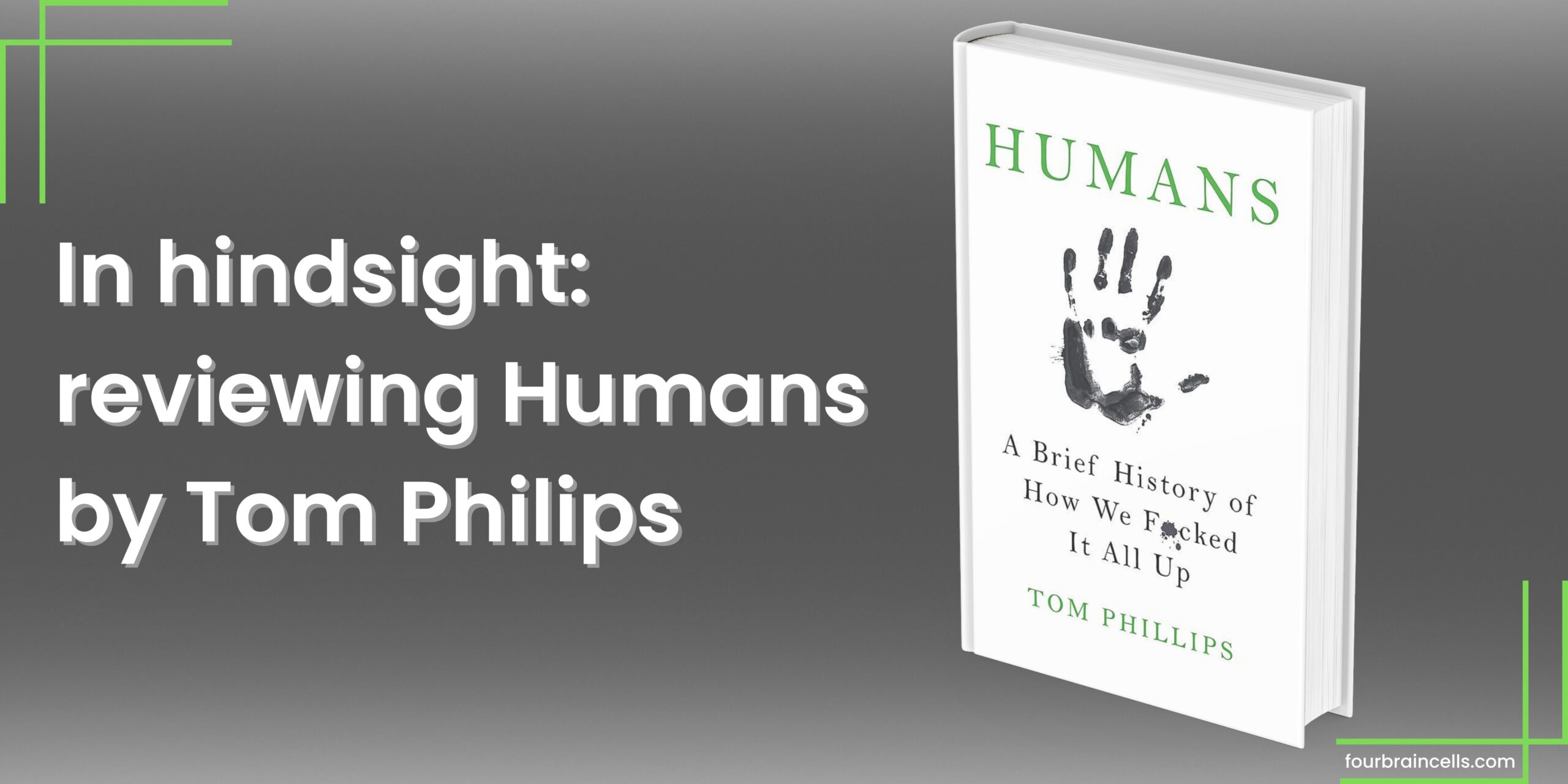Does the sheer stupidity of human beings bother you?
If yes, then Humans: A Brief History of How We F*cked It All Up by Tom Philips is going to make you bang your head on the wall on account of the f*ck-ups we’ve collectively made in history.
It all began when Lucy, our 3.2-million-year-old ancestor, accidentally fell from a tree and had her bones discovered. Since then, humanity has made it a point to fall and mess things up with utmost grace across history, art, science, culture, war, trade- you name it. That’s what Tom highlights in this hilarious book, making you juggle between ‘oh wow, and I thought I was stupid‘ and ‘oh no, I could easily be this stupid.‘
Tom starts with why our brain is an idiot, elaborating on the plethora of cognitive biases that help us make idiotic decisions in life.
We are then introduced to the massive f*ck ups that made our environment worse, followed by some great leaders making terrible decisions.
For starters, one of my favorite stories is that of Ala ad-Din Muhammad II, who helped a great deal in screwing up the human population for us. If you’ve never heard of the Khwarezmian empire, it’s thanks to this guy.
The Khwarezmian empire was pivotal in many ways- the Silk road, which was an important trade route, ran through Khwarezm. It boasted an advanced Islamic culture and strategic geography, one with the finest centers for innovation, culture, and great ideas.
Muhammad was the Shah of this vast empire at that time, and he certainly knew how to mess diplomacy up.
So one day, Genghis Khan, the founder of the Mongol empire, approached Muhammad for a trade deal, seeking to establish a genuine rapport with him. The camaraderie between the two would have been a win-win situation for merchants. After exchanging a few gifts, Genghis eventually sent out his first trade mission to Khwarezm with camels and troops and merchants loaded with silver, silk, and jade.
That’s when things start getting a little messed up.
The governor of Otrar, instead of welcoming these guests into his territory, beheaded them all and stole their goods. This did not sit well with the world, and nobody believed that the governor took this step without consulting Muhammad.
Genghis Khan, considering that the trade deal was important for the Mongols, decided to give Muhammad a second chance.
He sent three envoys again, asking Muhammad to punish the governor, return to peace and provide compensation for their loss.
We do not know whether it was insecurities, childhood trauma, or a lack of common sense- but Muhammad went on to behead the envoy and burn their beards, sending them back to Genghis mutilated.
Why in the world would you do that? Why?
Naturally, Genghis was now unstoppable. War followed, and he wiped out the entire Khwarezmian empire from history in less than 2 years. This episode turned out to be a classic case of how not to handle diplomacy, perhaps one that leaders today can learn from.
Another hilarious, yet very real conversion mistake that cost us $327 million was NASA’s Mars Climate Orbiter– whose failure makes me feel very, very relieved that even the finest of minds can slip up. Here’s what happened:
The investigation afterwards revealed what happened: the Orbiter was using the standard metric of Newton seconds to measure impulse (the total amount of thrust applied in a maneuver). But the software on the ground computer, supplied by a contractor, was using imperial measurements of pound seconds. Every time they’d fired the ship’s engines, the effect had been more than four times as much as they’d thought- with the result that the Mars Orbiter ended up over a hundred miles closer to the surface of Mars than it was supposed to. As it tried to go into orbit, it instead hit the atmosphere hard, and the cutting-edge $327 million spacecraft broke into pieces almost instantly.
As is evident, the prose throughout the book is peppered with sarcasm and bitter truth, without ever trying to be preachy or extra. The writing sold me from the very beginning, albeit it includes an unforgiving number of swear words.
Plus, it goes without saying that I learned about a lot of cool mess-ups, all of which make for great dinner table stories. For the history buffs out there, you won’t find any references or footnotes attached to the text-the narrative flows in a way that’s meant to be a light read, not an academic one.
Time and again, I was reminded of our collective gullibility, and why it’s best to not take life all that seriously. Concluding in Tom’s words,
So… did Lucy fall out of a tree? Maybe. Probably, even. In many ways, that’s the point of this book: we have this incredible feat of scientific deduction, and it might still be wrong. You can be a world leader in your field, doing the best work of your career, a ground-breaking study published in the world’s most prestigious journal that weaves together jaw-dropping advances in the fields of paleontology and physics, computing and medicine, forensics and geology to give us an unprecedented window into a time millions of years ago… and you still run the risk that someone will come along and go: ‘Hahaha, nope.’
All in all, Humans is a hilarious book, albeit one that has the potential to leave you depressed. If you revel in knowing about the inconsistencies of leaders and scientists alike, or if you think you’ve screwed up today, this one’s for you.

Leave a Reply